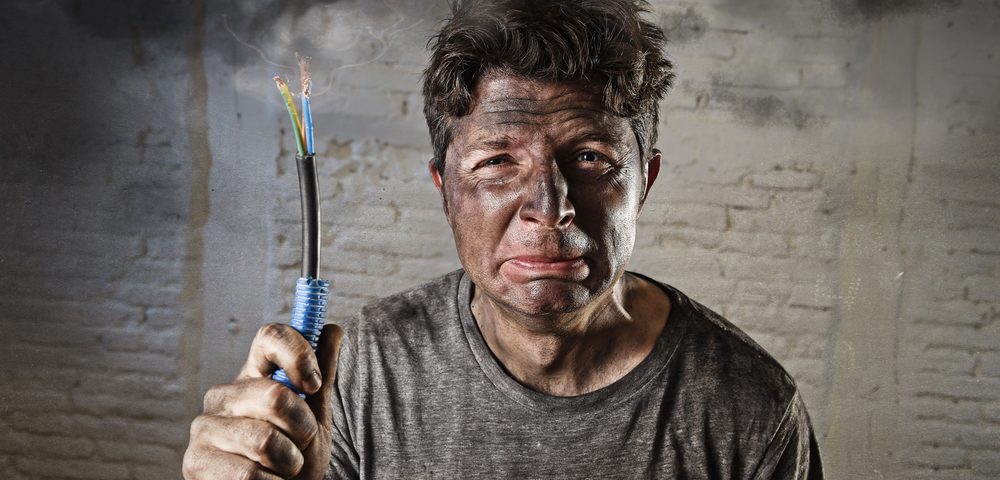There is nothing satisfying than some DIY. Electrical work is a little bit tricky as it is much more dangerous than picking up a paintbrush or putting up shelf’s, you can definitely do your own work in your own home. However, it is critical you are skilled and have a good understanding of exactly what the work you are carrying out will entail and the danger associated with it.
 It is not recommend that you do any of your own electrical work unless you have the necessary skills and knowledge before starting.
It is not recommend that you do any of your own electrical work unless you have the necessary skills and knowledge before starting.
If you do want to do some of your own electrical work it is important that you read the following information carefully.
Never do any electrical work unless you are sure you have the skills and knowledge to do the job safely and legally. Accidents, and sometimes fatalities, can occur because people do not know what they are doing. Electrical work can be unsafe and illegal if it’s not done properly.
Here are some tips before you get started:
- you have the necessary knowledge and skills
- the power is turned off
- you are not working where conductors or terminals are live or could become live.
What electrical work can I do?
You must own and live in the property to do the following work on low voltage electrical installations when there is no payment or reward:
- Remove and replace any of the following kinds of fittings, where the work does not involve work on any switchboard:
- switches
- socket outlets
- permanent connection units
- light fittings
- batten holders
- cord grip lampholders
- ceiling roses
- flexible cords connected to any permanent connection unit, ceiling rose, or cord grip lampholder
- water heater switches
- thermostats
- Remove and replace fuse links.
- Connect and disconnect fixed wired appliances.
- Relocate existing switches, socket outlets, and lighting outlets that are supplied with electricity by tough plastic- sheathed cables.
- Install, extend, and alter sub-circuits (including sub-mains), provided that you:
- must not enter (whether personally, by holding any material or equipment, or otherwise) any enclosure where live active conductors are likely to be present
- cannot connect your work to the electricity supply yourself
- must get the finished work tested and connected by a licensed electrical inspector who will verify the safety of the completed work before connecting it. It is advisable to have consulted the inspector prior to starting any installation, extension, or alterations.
You can repair an appliance if:
- you, or a close relative, must own it
- it must be for use by you or a close relative
- it must not be for commercial or industrial use
- Before you start work, make sure that the appliance is unplugged from the electricity supply. It is dangerous to work on it if it is connected.
- If the appliance is permanently connected to an electricity supply, ensure that the mains power is switched off before commencing work.
Electrical DIY Repairs:
- Replacing switches; socket outlets, lamp holders, ceiling roses, water heater switches, thermostats and elements
- Repairing light fittings
- Moving, repairing or replacing flexible cords that are permanently connected to outlets or ceiling roses
- Disconnecting and reconnecting permanently wired appliances
- Moving switches, sockets and lighting outlets, but only if they are wired with tough plastic-sheathed cables
- Installing, extending, or altering any cables, except the main cables that come from the street to your switchboard
- Fitting plugs, cord extension sockets or appliance connectors to a flexible cord
- Replacing fuse wires and fuse cartridges
Doing your own wiring:
- Make sure that the power is switched off before you start.
- Ensure that you do not work in any enclosure where conductors or terminals are live or could become live.
- Ensure that if you install, extend or alter cables, you do not connect your work to the electricity supply yourself.
- The finished job must be checked and tested by a licensed electrical inspector. If it complies with safety requirements, the inspector will connect it, test it, and issue you with a Certificate of Compliance.
Never do any work on a switchboard apart from replacing fuse wire or fuse cartridges.
Important
Employers, employees, landlords, tenants and school staff (including caretakers) cannot carry out electrical work in their workplace or any rented property unless they are registered electrical workers and hold current correct qualifications.
If something goes wrong?
If you are unsure about anything or think that you might have made a mistake, make sure that the main switch is turned off, and call a licensed electrician to check your work and correct it if necessary. If you do work that is unsafe you could seriously injure yourself or a member of your family and you could be prosecuted.

